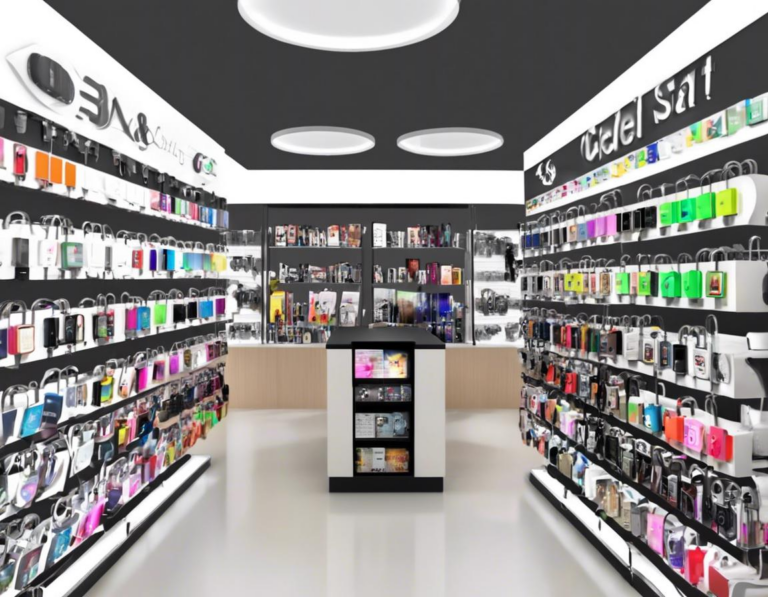How to Start a Cell Phone Accessory Store

The mobile phone industry is booming, and with it comes a huge demand for accessories. From sleek cases and screen protectors to powerful chargers and wireless earbuds, there’s a vast market for cell phone accessories. If you’re looking to start a business with a lot of potential, opening a cell phone accessory store could be the perfect opportunity.
This comprehensive guide will walk you through the steps of starting your own cell phone accessory store, from market research and business planning to choosing the right location and marketing your brand.
1. Conduct Thorough Market Research
Before diving into starting a cell phone accessory store, it’s crucial to understand the market you’re entering. This includes:
- Identifying your target audience: Who are you selling to? Are you focusing on budget-conscious customers, tech enthusiasts, or specific demographics like young adults or professionals?
- Analyzing your competition: Who are your main competitors in the area? What are their strengths and weaknesses? What sets them apart?
- Exploring product demand: What are the most popular cell phone accessories in your area? What are the latest trends?
- Understanding pricing strategies: How do competitors price their products? What are the profit margins like?
This information will help you develop a unique selling proposition and differentiate your business from the competition.
2. Create a Detailed Business Plan
A well-structured business plan is essential for securing funding, attracting investors, and guiding your business decisions. Here’s what should be included:
- Executive Summary: A concise overview of your business goals, products, and target market.
- Company Description: Details about your business structure, mission statement, and unique selling proposition.
- Market Analysis: A detailed analysis of your target market, competition, and industry trends.
- Products and Services: A comprehensive list of the cell phone accessories you’ll offer, including their features, pricing, and supplier information.
- Marketing Plan: Outlines your strategies for reaching your target market, including online and offline marketing tactics.
- Financial Projections: Detailed financial projections for the next 3-5 years, including revenue, expenses, and profit margins.
- Management Team: Information about your management team, including their experience and qualifications.
3. Secure Funding
Starting a business requires capital. Here are some common funding options for a cell phone accessory store:
- Personal Savings: Use your own savings as a starting point.
- Loans: Explore small business loans from banks or credit unions.
- Grants: Research government grants and programs designed to support small businesses.
- Investors: Seek funding from private investors or angel investors.
- Crowdfunding: Utilize platforms like Kickstarter or Indiegogo to raise funds from the public.
The amount of funding you’ll need depends on factors like the size of your store, inventory costs, and initial marketing expenses.
4. Choose the Right Location
The location of your cell phone accessory store is crucial for attracting customers. Consider these factors:
- Foot traffic: Choose a location with high foot traffic, such as a shopping mall, busy street, or near a popular retail area.
- Visibility: Ensure your store is easily visible to potential customers.
- Accessibility: Select a location with convenient parking and easy access for customers.
- Competition: Analyze the competition in the area and choose a location that complements your business model and target audience.
5. Source High-Quality Products
The quality of your cell phone accessories is key to building customer trust and loyalty. Here are some tips for sourcing products:
- Establish relationships with reputable suppliers: Research and connect with reliable suppliers who offer high-quality products at competitive prices.
- Consider different product categories: Offer a diverse range of accessories, including cases, screen protectors, chargers, headphones, and other popular items.
- Stay updated with trends: Keep an eye on the latest technology and trends in the cell phone accessory industry to offer the most sought-after products.
6. Set Up Your Store
Once you’ve secured funding and chosen a location, it’s time to set up your store. This includes:
- Store layout and design: Create an inviting and organized layout that showcases your products effectively.
- Inventory management: Implement a system for tracking and managing your inventory levels.
- Point of sale (POS) system: Invest in a reliable POS system to process transactions efficiently.
- Customer service training: Train your staff to provide excellent customer service and answer product questions.
7. Develop a Marketing Strategy
To attract customers to your cell phone accessory store, you need a strong marketing plan. Consider these strategies:
- Local marketing: Utilize local advertising methods like print ads, radio spots, and flyers.
- Online marketing: Create a website and utilize social media platforms like Facebook, Instagram, and Twitter to reach a wider audience.
- Email marketing: Build an email list and send out newsletters with promotions, new product launches, and exclusive deals.
- Partnerships: Collaborate with local businesses or influencers to cross-promote your products.
- Promotions and discounts: Offer special promotions and discounts to attract customers and generate interest.
8. Provide Excellent Customer Service
Outstanding customer service is essential for building a loyal customer base. Here are some tips:
- Be knowledgeable about your products: Ensure your staff is well-versed in the features, benefits, and compatibility of all the accessories you sell.
- Be friendly and approachable: Create a welcoming and positive environment for customers.
- Address customer concerns promptly: Respond to customer feedback and resolve issues quickly and efficiently.
- Offer after-sales support: Provide assistance with product setup, troubleshooting, and repairs.
9. Stay Competitive and Innovate
The cell phone accessory market is constantly evolving. To stay competitive, you need to:
- Stay informed about industry trends: Keep up with the latest technologies and trends to offer the most in-demand products.
- Monitor your competition: Analyze your competitors’ pricing, promotions, and product offerings to stay ahead of the curve.
- Invest in new technologies: Explore innovative solutions like online ordering, mobile payments, and social media integration.
- Offer unique and personalized services: Provide value-added services like customization, repairs, or consultations to differentiate your business.
10. Embrace Technology
Technology plays a vital role in running a successful cell phone accessory store. Utilize these tools:
- Website and e-commerce: Create an online store to reach a wider audience and offer convenient shopping options.
- Social media marketing: Engage with customers on social media platforms to build brand awareness and drive sales.
- Mobile payments: Accept various payment methods, including mobile wallets and contactless payments.
- Inventory management software: Use software to track inventory levels, manage orders, and streamline your operations.
11. Seek Professional Advice
As your business grows, consider seeking professional advice from experts in:
- Accountants: Seek guidance on financial management, tax planning, and accounting practices.
- Lawyers: Consult with a lawyer for legal matters related to contracts, intellectual property, and business structure.
- Marketing consultants: Get professional help with developing a comprehensive marketing strategy and reaching your target audience.
Conclusion
Opening a cell phone accessory store can be a lucrative venture with potential for growth. By conducting thorough market research, creating a detailed business plan, and implementing the strategies outlined in this guide, you can increase your chances of success. Remember to focus on providing high-quality products, exceptional customer service, and staying competitive in the ever-evolving mobile technology industry.













